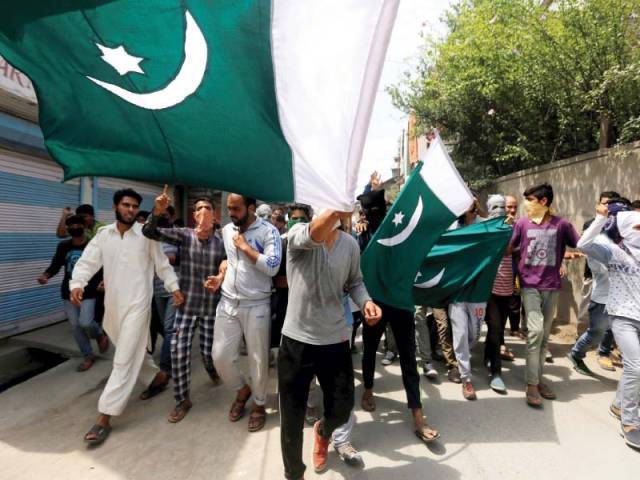
As all eyes focus yet again on the turbulence generated by Imran Khan and his merry men and women, Pakistan will revert to its comfort zone of persistent, consistent and perhaps even insistent turmoil. We like to keep the pot boiling. Some say these are growing pains we must endure; that the system will become less brittle through an unfolding process of political battles that open up space for greater activity, discourse and debate. Such an outcome of course is premised on the assumption that dharnas, rallies and marches will not push the system over the edge.
If all this sounds vaguely familiar, that’s because it is. Rewind two years and similar activity by similar people had led to similar fears, hopes and expectations. Every possible scenario, every possible outcome and every possible theory, counter-theory and conspiracy theory was discussed to death.
And yet the same questions return to haunt us: Who’s behind Qadri and Imran? Is the Establishment out to get Nawaz again? Will the government survive this fresh assault? Is the top general planning to hang his spurs? Is the system under threat yet again? Is there a grand master plan scripted, approved and ready for execution?
These questions reflect a sense of anxiety within society that refuses to ebb away despite the best effort of governments. Yes the last few years have witnessed the birth of a ‘feel good’ factor among the citizens, but a sense of dread lurks underneath this veneer of positivity. It is dread borne of habit and history.
Just when you think terror is under control, terrorists strike again. Just when you think political stability is here to stay, politicians lunge for each other’s throats. Just when you think Karachi has embraced normalcy, MQM tears itself apart. Just when you think we are slouching towards the next general elections, uncertainty buys itself a return ticket.
Oh look there’s the man on the container thundering about corruption; look there’s the premier rubbishing allegations and boasting about public projects; look there’s the young Bhutto pretending yet again to do some kind of politics; and look there’s the sombre numero uno of the Establishment putting the bellicose Indians in their place.

Does any single line connect these dots? Even if it doesn’t, what this feverish activity on the political landscape reflects is a society grappling with its fears, concerns and yes, anxiety. Not a bad thing actually. Shouting, screaming, finger-pointing and insult-mongering is a hallmark of every democracy. In fact nobody does this better than the Americans as they ready themselves to elect a new leader. Anxiety is an integral part of life in an open, pluralistic society.
Why worry then?
There are good reasons. In established democracies, the fundamentals of nurturing society are not under any dispute. These fundamentals are a recognised reality drilled into the foundation of society through a consensus built over time.
So kids go to school. All of them. By law. That’s a given. There exists a consensus that the state provides solid education free of cost to all children of all ages till their college-going age. No one can even in their worst nightmares imagine that their children would grow up without going to school.
And justice is delivered. Sure there are miscarriages of justice occasionally, and bad prosecution, or faulty evidence, or good legal arguments can save the guilty and hang the innocent, but these are exceptions and not the norm. No one in these societies can imagine not having recourse to justice.
And all are equal before law. Yes incidents do emerge where certain individuals or communities get preferential treatment, but these are not the norm either. No one can ever imagine their leader breaking the law of the land and getting away with it.
These and a few other fundamentals form the bedrock of the social contract that exists between the rulers and the ruled. The contract draws its legitimacy from the notion that rulers draw their own legitimacy from the will of those they rule. This legitimacy in turn is premised on the rulers providing the ruled the fundamentals of all rights and privileges — like education, justice and law for all.
In the absence of these fundamentals, no amount of money, projects, elections, parliaments, and democratic superstructures can buy the rulers any social or political legitimacy.
Pakistan is missing out on the fundamentals because Pakistani leaders are unable or unwilling to comprehend the integral, central and absolutely critical value of these fundamentals. It’s useless to keep climbing up the ladder if the ladder is leaning against the wrong tree.
The anxiety that burnishes our psyche is directly — though perhaps subconsciously — linked to the absence of these fundamentals in the lives of most Pakistanis. Dharnas, rallies and turbulence on the streets are not by themselves the root of anxiety — they are possibly a by-product of society’s dread about the future. Such dread is exacerbated by the sinking realisation that the fundamentals of progress, nay the fundamentals of our future and that of our children, are not even part of the political discourse between leaders.
This discourse sadly is defined by individual, party and institutional interests that stink of short-term opportunism. Has a road project ever transformed a poor, uneducated, unequal and weak-lawed society into a regional powerhouse? Even if it’s a project as lofty as the CPEC? Is the scale of our vision and ambition as limited as becoming a transit route for powerful countries so we can live off the rent they pay us? Are we unable to dream anything more than becoming an expensive carpet over which rich countries can walk?
Mediocre minds cannot think beyond the obvious; they cannot understand that without the fundamentals, Pakistan cannot grow into a modern society that can generate its own knowledge, expertise, technology and wealth. This nation was meant to be much, much more.
Think small, stay small.
Published in The Express Tribune, September 4th, 2016.
Like Opinion & Editorial on Facebook, follow @ETOpEd on Twitter to receive all updates on all our daily pieces.


1732538123-0/BeFunky-collage-(90)1732538123-0-165x106.webp)

1732536148-0/ariana-(1)1732536148-0-165x106.webp)







COMMENTS (11)
Comments are moderated and generally will be posted if they are on-topic and not abusive.
For more information, please see our Comments FAQ